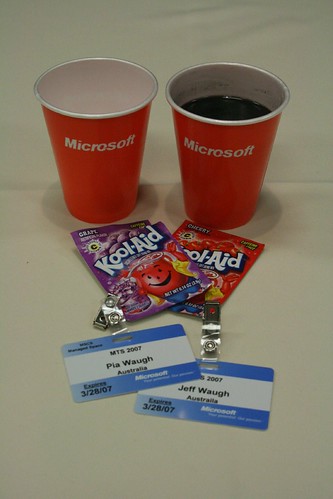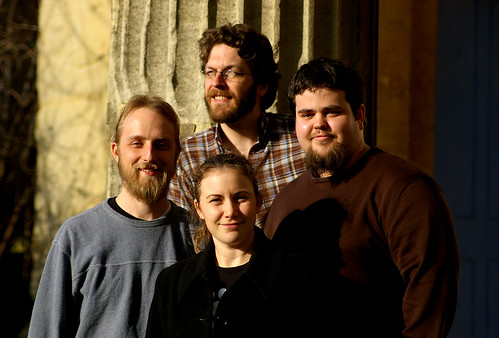Come check out the Linux Australia stand, OSIA stand and the Open CeBIT Seminar Theatre where there are talks happening about Open Source for the entire 3 days of CeBIT. Todays schedule is below:
- 11:05 Introducing Red Hat Enterprise Linux 5 – Martin Zierer – Red Hat
Red Hat redefines value in the IT industry. Again. Red Hat Enterprise Linux 5, released in March 2007, contains more than 1200 components with development spanning over a two year period, so there are a huge number of new features covering a broad range of functionality. Red Hat Enterprise Linux 5 provides CIOs and IT managers with the means to reduce costs while improving operational flexibility throughout their computing infrastructure. Join us in this session to learn more about these features and how you can apply them within your IT environment. - 11:25 The use of Asterisk IP PABX in SMEs using 2 case studies – Maria Padisetti – Digital Armour
Digital Armour (DA) is a leading Open Source provider for Asterisk implementations, customisations and support. Digital Armour has significant expertise in customizing Compiere and a number of other open source business applications. DA’s focus is to help level the IT playing field for SMEs through the use of open source business applications. DA has helped several SMEs achieve productivity and amazing business benefits through the use of innovative open solutions. - 12:05 – Linux in the Data Centre – Is it ready yet? – Paul Kangro – Novell
This session examines the attributes of a modern data centres and looks to see if Linux can provides all the required services. In particular we look at aspect of security, high availability and the virtulisation – we also examine some of the trends around virtualising applications. - 13:05 – Ideas for Innovators… Get Inspired. – Bruce Bogart – IBM
Bruce’s presentation will be covering IBM’s commitment to Open Source development and applications for Service Orientated Architecture (SOA). He will explain that through combining IBM WebSphere with Linux and Open Source products, SOA projects can be achieved with lower hardware, software and services costs whilst still maintaining quality and flexibility to respond to business changes. - 13:25 Synergy’s Forms Integration Hub – Peter Faulkner – Synergy Plus
Does your organisation process large amounts of forms across mutliple channels, including internet, email and direct post? Now is the time to learn about this innovative technology simplifying forms delivery. Based on IBM’s Workplace Forms, Synergy’s Integration Hub is a web-based administration tool that allows organisations to build integrated forms solutions faster and cheaper, to streamline the implementation of a number of common scenarios, including: Support for paper and electronic forms Data capture and straight through processing Centralised forms processing Connected or disconnected electronic forms - 14:05 The OKL4 Microkernel – A High-Performance Virtualization Platform – Gernot Heiser – Open Kernel Labs
Open Kernel Labs (OK), a spin-out from NICTA, will introduce OKL4, a high-performance virtualization platform for mobile and consumer electronics devices. OKL4 is currently deployed on the latest Qualcomm CDMA chipsets and other mobile phones and consumer devices. The talk will cover basic virtualisation concepts and its benefits to high-end embedded systems and also offer a view into the future plans of this new company. - 14:25 The Advantages of Open Source Communities for Embedded Developers – Mark Phillips – Automated Test Systems
One of the greatest problems in embedded system is the shear size of the interface domain. This not only includes a large number of interface chips, some (most) with proprietary add-on’s to standard interface protocols and busses but also includes the shear no of different processors combined with differing memory types and layouts. Entry into embedded systems for the first time can be daunting. Thankfully Open Source is built around the concept of on-line social communities helping one another to achieve their respective goals. This is especially true when it comes to embedded systems as finding specific information needed to solve a specific problem across the wide range of interfaces is time consuming to say the least. - 15:05 The Inevitability of “mixed-IP environments” – Alan Facey – Black Duck
Alan will discuss the risks and complexities inherent in developing software in a mixed-IP environment. He will introduce Black Duck Software’s protexIP solution that lets software engineers and lawyers analyze, manage, store, and share software compliance management information in order to reduce those risks and complexities. - 15:25 Ingres – Justin Bullock – Ingres Australia Ingres – The Open Source Model you want with the Enterprise strength you need.
Ingres, the leading Enterprise Open Source Database company with over 10,000 customers worldwide, has proved the strength of the Open Source Model for mission critical applications.


